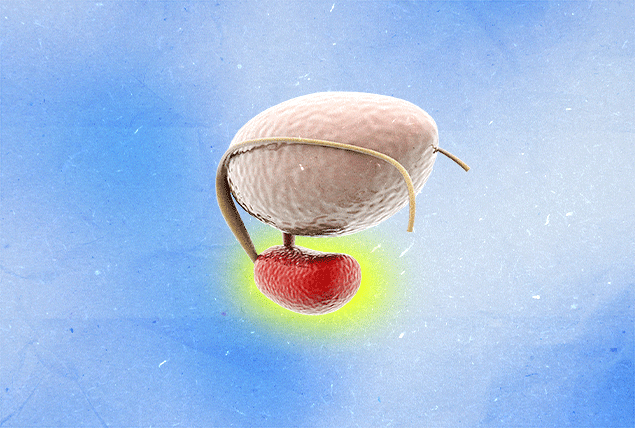That UTI You Thought You Couldn't Get May Cause Prostatitis

Yes, men can get urinary tract infections (UTIs), too. They're not just a women's issue. Left untreated, the infection could potentially progress. The UTI could cause bacterial prostatitis (inflammation of the prostate gland), kidney infection and even sepsis, a life-threatening condition.
Urinary tract infections are among the most common clinical bacterial infections in women, affecting more than half of women at some point in their lives. By comparison, about 12 percent of men get a UTI in their lifetime, according to the American Urological Association (AUA).
Women are at greater risk of UTIs due to anatomy; they have a shorter urethra, the tube urine travels through. There isn't as much distance between the opening of the urethra and the bladder in women as there is in men, so bacteria don't have to travel as far from outside the body into the bladder.
Any condition that leads to incomplete emptying of the bladder can cause a UTI in men, according to Neel Parekh, M.D., a men's fertility and sexual health specialist with Cleveland Clinic. One such condition is benign prostatic hyperplasia (BPH), or an enlarged prostate, which is especially common in older men.
"As we age, the prostate enlarges, and that can make it difficult to empty the bladder completely," Parekh said.
In addition to BPH, there can be a blockage within the urethra or urinary tract that's not allowing the bladder to empty completely. A neurogenic cause, such as nerve issues or diabetes, can also lead to UTIs.
Voiding dysfunction, in which there is poor coordination between the bladder muscle and the urethra, may also contribute to an infection. Men who don't go to the bathroom when they need to and regularly hold their urine for long periods, waiting until the last second to urinate, are more at risk for a UTI.
"The more you have urinary stasis, the bacteria can multiply in the bladder and lead to a full-blown urinary tract infection," Parekh said. "Similarly, constipation can sometimes make it difficult to empty the bladder completely."
How commonly does a UTI cause prostatitis?
When the bacteria that cause a UTI migrate through the urinary tract and reach the prostate gland, it may cause acute bacterial prostatitis. However, Parekh finds this occurrence isn't common. Men typically have the UTI treated and do what they're supposed to do, including drinking lots of water to help flush the bacteria out of their system.
Sometimes a UTI resolves without treatment, and many patients are misdiagnosed with bacterial prostatitis, according to Parekh.
"A lot of patients come to see me that were diagnosed with prostatitis, but they really never had a true bacterial infection," he said. "Their cultures were negative. They were treated with antibiotics just empirically, based on their symptoms."
The vast majority of these patients actually have nonbacterial prostatitis, which is not due to a bacterial infection and should not be treated with antibiotics.
"They typically have another issue going on as opposed to actual bacterial prostatitis," Parekh said. "As far as actual bacterial prostatitis from a urinary tract infection, I would say it's not very common. I don't see it develop into bacterial prostatitis too often."
Bacterial prostatitis may be caused by direct inoculation of the bacteria into the prostate, such as after a procedure like a prostate biopsy or having a catheter inserted, Parekh added.
"That can lead to some trauma to the prostate, which would allow the bacteria to enter the prostate," he said.
Prostatitis may also develop via the bloodstream.
"When you have an untreated urinary tract infection, it can enter the bloodstream and go into the prostate that way," Parekh explained.
Asked how commonly UTIs directly cause bacterial prostatitis, Arthur L. Burnett, M.D., a professor of urology at Johns Hopkins Medicine in Baltimore, said most of the time, they don't.
"Symptomatically, a patient can be treated and then rid himself of the prostatitis that seems to be related to the true bacterial infection," Burnett said. "At the same time, it is possible for men to have chronic bacteria within the prostate causing long-term irritation."
Acute bacterial prostatitis happens suddenly and lasts a short time, while the chronic type develops slowly and lasts many months. Chronic nonbacterial prostatitis, or chronic pelvic pain syndrome (CPPS), is the most common type of prostatitis.
Diagnosis and treatment
The symptoms of UTI and bacterial prostatitis have a lot of overlap, Parekh said. Both cause increased urination and pain or burning during urination. There may be some blood in the urine or some incontinence.
However, men with prostatitis generally experience a different sensation.
"Specifically, guys will describe 'sitting on a golf ball' type feeling, so they'll have pain in their perineal area," Parekh said, referring to the area between the anus and genitals. "That's more typical for prostatitis."
Diagnosis of a UTI is made with a urine culture. The first line of treatment is to start the patient on oral antibiotic medications.
Parekh has the patient urinate in the office and conducts a post-void residual urine test to measure the amount of urine left in the bladder. He then looks at the ultrasound of their bladder to make sure they're emptying fully and not retaining urine.
"Because if they are in urinary retention, they may need a catheter to adequately drain the infected urine from the bladder," he said.
Antibiotics usually clear up the urinary tract infection in seven to 10 days.
"The recommendation is to complete the full course of antibiotics to prevent the development of antibiotic resistance," Parekh said.
Bacterial prostatitis is treated with antibiotics, too.
"We may empirically treat patients, too, meaning a urine sample may be obtained. If the urinalysis is negative, we may send a urine culture," Burnett said. "That may not even be positive. Sometimes we will go ahead and give a patient a course of an antibiotic because it may be of some benefit. Some patients always shed bacteria right in the urine that we can easily confirm, but they may have some deep-seated infections within the prostate. And so a trial of antibiotics is, many times, done for patients."
If the patient improves, Burnett may conclude there was residual infection deep within the prostate that's been eradicated.
"On the other hand, many of these patients, we give them antibiotics and a second course of antibiotics, and they still persist with symptoms," Burnett said. "Then we have to accept the fact that this may not truly be an infectious kind of a prostate situation. It may actually fall within the category of chronic pelvic pain syndrome."
Be sure to see your doctor if you suspect you may have developed a urinary tract infection or are suffering from symptoms that may be caused by prostatitis. Don't have a doctor you see regularly? You should. Fortunately, telehealth makes it easy to connect with a doctor who can answer your questions and evaluate your situation.
Many physicians offer video visits, which are a good way to see a doctor quickly since a lot of them have same-day appointments. Giddy Telehealth is an easy-to-use online portal that provides access to hundreds of healthcare professionals whose expertise covers the full scope of medical care, including men's health.
Editor's note: Do you have a personal urinary tract infection or prostatitis story you'd like to share? Giddy welcomes first-person accounts that break down stigmas and connect with readers to let them know they're not alone. To share your story, send a message to Mike Werling at mwerling@getmegiddy.com.


















